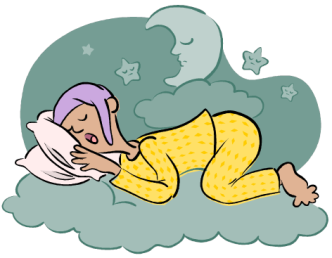Problems sleeping can really ruin your day, not to mention wreak havoc on the body’s ability to function properly. In addition to feelings of fatigue and irritability, lack of sleep can have some serious health consequences. According to the Centers for Disease Control and Prevention, insufficient sleep is becoming a major public health problem and has been linked to motor vehicle accidents and occupational injuries, medical conditions, and general decrease in productivity and ability to focus. Lack of sleep can also impair immune functioning and increase susceptibility to illness, which is the last thing you need during flu season! Below are some helpful tips on getting a more restful night. If you’re not seeing improvement after making changes to your routine and/or serious sleep issues are disrupting your daily life, it may be best to consult a physician.
Consistency is key – Although it may be difficult with a busy schedule, setting – and sticking to – a consistent sleep schedule can help you get the most out of your slumber time. Setting a regular schedule by sleeping and waking around the same time each daycan improve sleep habits, and avoid staying up late to make this plan really work.
Before bedtime, avoid these to get your Z’s – Within a few hours of bedtime, alcohol, naps, meals, exercise, and caffeine and nicotine can all hinder a good night’s sleep. Avoid eating meals and drinking right before bed, exercise earlier in the day, and try not to nap too late in the day. Engaging in these activities before bed can make it difficult to fall asleep, and may cause you to wake periodically throughout the night.
Set the mood to snooze – We constantly surround ourselves with things that inhibit sleep; television, the computer, music, gaming, lighting, and even our cell phones are late-night distractions from lulling into peaceful slumber. Many of these things can disrupt hormones and the sleep cycle, leaving you groggy and sluggish in the morning. Turn off anything that tends to keep you up at night and avoid habits that create obstacles to sleeping well (such as falling asleep on the couch).
Winding down and waking up – “Winding down” kind of goes with the last tip – find activities that help you become sleepy, rather than activities that will keep you up at night. Whether it’s reading a book, using aromatherapy, taking a hot shower, or listening to soft music, engaging in an activity that is relaxing is important to help you fall asleep. As for waking up, exposure to natural light can be a huge help. If possible, face the bed near a window that gets sufficient sunlight, or invest in a clock that incorporates a light mechanism for waking. Also, avoiding the “snooze” button and engaging in physical exercise or light stretching can help in waking up.
Information obtained and adapted from the following sources:
– Insufficient Sleep is a Public Health Epidemic. Centers for Disease Control and Prevention. http://www.cdc.gov/features/dssleep/
– Tips for getting a good night’s sleep. (2012). NIH MedlinePlus, 7(2), 20. http://www.nlm.nih.gov/medlineplus/magazine/issues/summer12/articles/summer12pg20.html
This information is provided courtesy of the Wyoming AgrAbility Project. For more information, visit our website or call toll-free at 866-395-4986.

Leave a comment